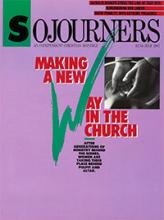HOW CAN YOU CALL YOURSELF a Catholic and be a feminist?" "How can you call yourself a feminist and be an active Catholic?" Both of these questions have been proposed to me--at times, with gentle curiosity, at other times, with aggressive challenge. Sometimes it is a Catholic who asks; sometimes a feminist. My usual response is, "Well, I am." The response is brief but open to dialogue if the questioner is interested.
The two questions point to tensions in my life that are not easily lived with nor readily resolved. Being a Catholic feminist and a feminist Catholic has demanded of me a fidelity that goes beyond ideology and religiosity and the ready answers and easy community each can provide. For me the struggle has been to engage in as honest a dialogue as possible between the two realities as I seek my personal truth in relation to both. I have also had to learn to live with the human frailties and sinfulness, as well as the moments of grace, in all three realities--the church, the feminist movement, and myself.
I am a Roman Catholic. That statement does not so much identify the church of my affiliation as it names a fundamental dimension of my identity. I am who I am today because I was born into an Irish Catholic family; attended Catholic grade school, high school, and college; entered a community of Catholic sisters, the Adrian Dominicans; and have lived my adult years as a person publicly identified with the church.
I am a feminist. That statement does not so much identify my politics as it defines the meaning of myself as a woman. To be a feminist is to assert the fundamental equality between the genders. Feminism shapes my vision for the transformation of the church and the world, a vision which gives abiding commitment, direction, and energy to my life's work for justice and peace.
Read the Full Article

